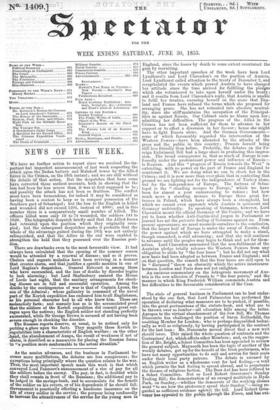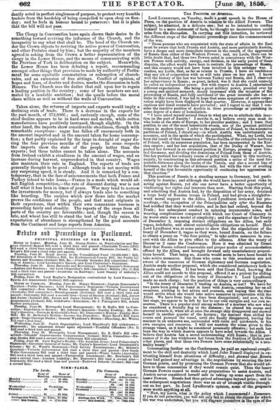As the session advances, and the business in Parliament be-
comes more multifarious, the debates are less conspicuous ; the exceptions being principally where the question relates to the war. Thus, the most important speech made this week is that which conveyed Lord Panmure's announcement of a rise of pay for all the soldiers before the enemy. The pay, in fact, is doubled while they shall remain in front of the Russians' the additional pay to be lodged in the savings-bank, and to accumulate for the benefit of the soldier on his return, or of his dependents if he should fall. Government is practically effecting a handsome insurance on the life of every soldier in the service ; the purpose being confessedly to increase the attractiveness of the service kr the young men in
England, since the losses by death to some extent counteract the gain by recruiting.
The other important speeches of the week have been Lord Lyndhurst's and Lord Clarendon's on the position of Austria. Lord Lyndhurst called attention to the treaty of December 2, and recapitulated the events which proved Austria to have changed her attitude since the time arrived for fulfilling the pledges which she volunteered to take upon herself under the treaty; and it results from Lord Clarendon's reply, that Austria is unable to fulfil her treaties, excusing herself on the score that Eng- land and France have refused the terms which she proposed for arranging peace. She has not retreated into absolute neutral- ity, since she stilt maintains the occupation of the Principal- ities as against Russia. Our Cabinet casts no blame upon her ; admitting her difficulties. The progress of the Allies in the Crimea has not been sufficient for them to advance in her support or to effect a diversion in her favour ; hence she might have to fight Russia alone. And the German Governments— some of which favourably regarded the intervention of the Western Powers—have been alienated by the attacks of the press and the public in this country ; Prussia herself being still less friendly than before. Probably, the debates on the Fo- reign Enlistment Bill had a large share in producing this impres- sion. The broad consequence is, that so much of Europe is con- fessedly under the predominant power and influence of Russia— is Russian. And this "progress of Russia towards the West" is extending, with no power on the part of France and England to counteract it. We are doing what we can to check her in the Crimea ; and it is now more than ever plain that in contesting that ground we are fighting not for the independence of Turkey alone, but for the independence of Europe. The fortress of Sebas- topol is the " standing menace to Europe," which we have been for almost a year endeavouring to reduce ; but how much more a standing menace to Europe those great for- tresses in Poland, which have always been a stronghold, but which we cannot even approach while Austria is quiescent and Germany unfriendly. In speaking of Germany, however, Lord Clarendon meant the,official Germany of the Courts ; and we have yet to learn whether Anti-Continental jargon in Parliament or journal has set the patriotic feeling of Germans against us. From present appearances, we must reconcile ourselves to the conclusion,
that the larger half of Europe is under the sway of Russia; that the power against which we have attempted to make a stand, though unmasked, is still advancing ; and that she will continue to advance until the peoples may begin to think and act for them- selves. Lord Clarendon announced that the non-fulfilment of the Austrian pledge totally releases the Western Powers from any
obligation to abide by "the four bases " ; but he did not say what new basis had been adopted as between France and England; and on that question, the remark that the four bases are still open to be "discussed" threw an obscurity which the active intercourse between London and Paris does not yet enlighten. An ominous commentary on the retrograde movement of Aus- tria is the new adhesion of Prussia to "the four points," and the manner in which King Frederick William commends Austria and her difficulties to the favourable consideration of the Czar.
The state of general business in Parliament can be best under- stood by the one fact, that Lord Palmerston has performed the operation of declaring what measures are to be packed, if possible, into the great portmanteau of the statute-book, and what are to be thrown over as lumber—all education bills among the latter. Apropos to the virtual abandonment of the Jew Bill, Mr. Thomas Dancombe has challenged the position of Baron Rothschild, the unsitting Member for London; who is perhaps disqualified techni- cally as well as religiously, by having participated in the contraet for the last loan : Mr. Dunoombe moved direct that a new writ should issue, This raised the whole question of contracts and the Contractors' Act, which affects other Members ; and, on the sums- tion of Mr. Bright, a Select Committee has been appointed to review the general subject. Maynooth has been the topic of another of Oe weekly debates, got up for the benefit of the Irish performers, who have not many opportunities to do suit and service for their seats under their local party patrons. The debate is excused by an English writer as a wholesome vent for bad feeling,—a vent which permits the bad feeling to spread abroad, and to perpetuate the disease of religious faction. The Beer Act has been referred to a Select Committee. Not so Lord Robert Grosvenor's Sunday Trading Bill; the demonstration of an enraged multitude in Hyde Park, on Sunday—whither the democrats of the working classes went "to see how the aristocracy spend their Sunday,"—being re- garded as sufficient evidence against tlpe WO. 1.4g Robert clros- mg has appealed to tke pt514i9 tlireailll the 2Visssi and has Orb' dently acted in perfect singleness of purpose, to protect very humble traders from the hardship of being compelled to open shop on Sun- day ; and he feels in honour bound to persevere.: but it is plain that the bill will not' pass.



































